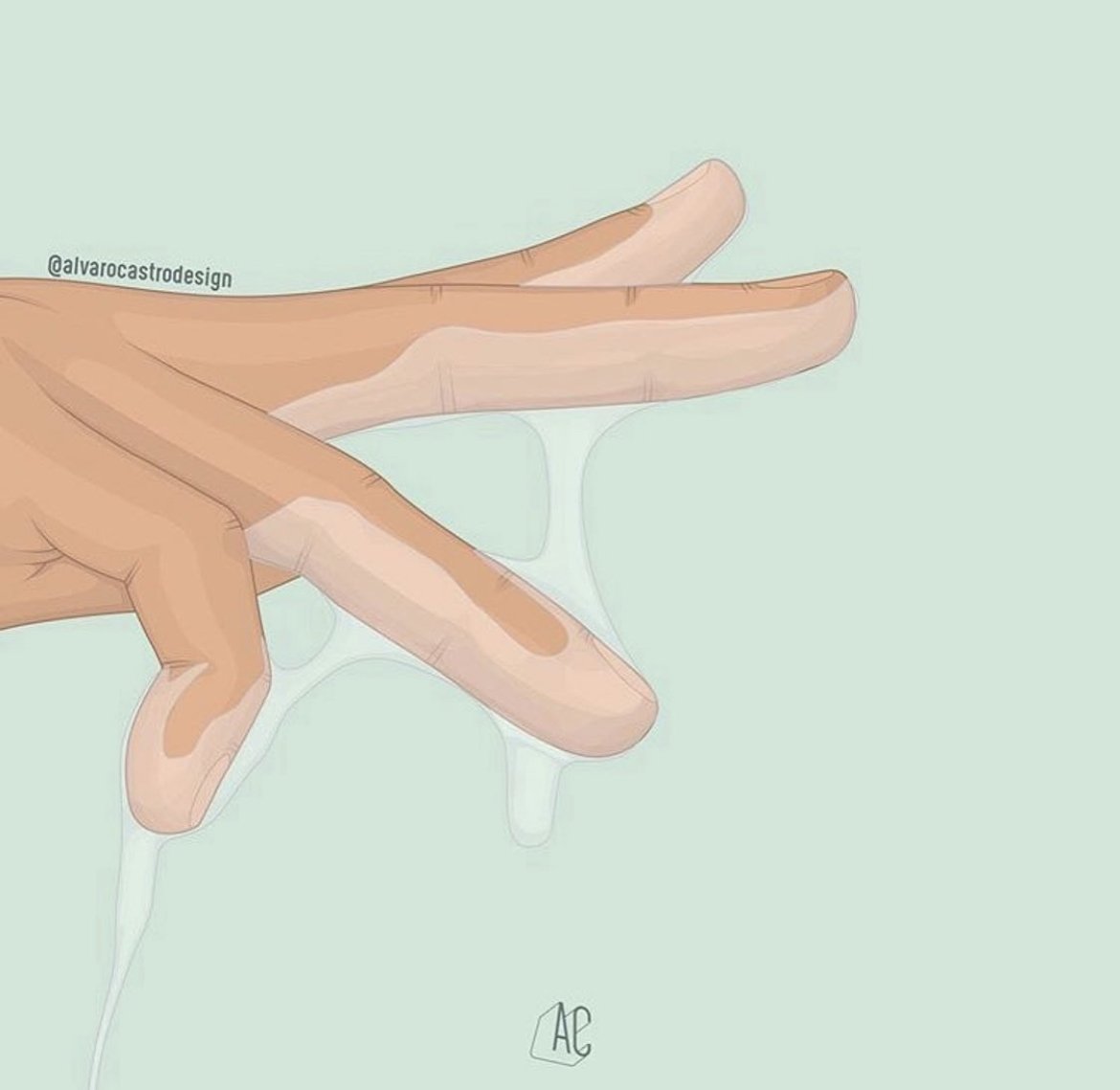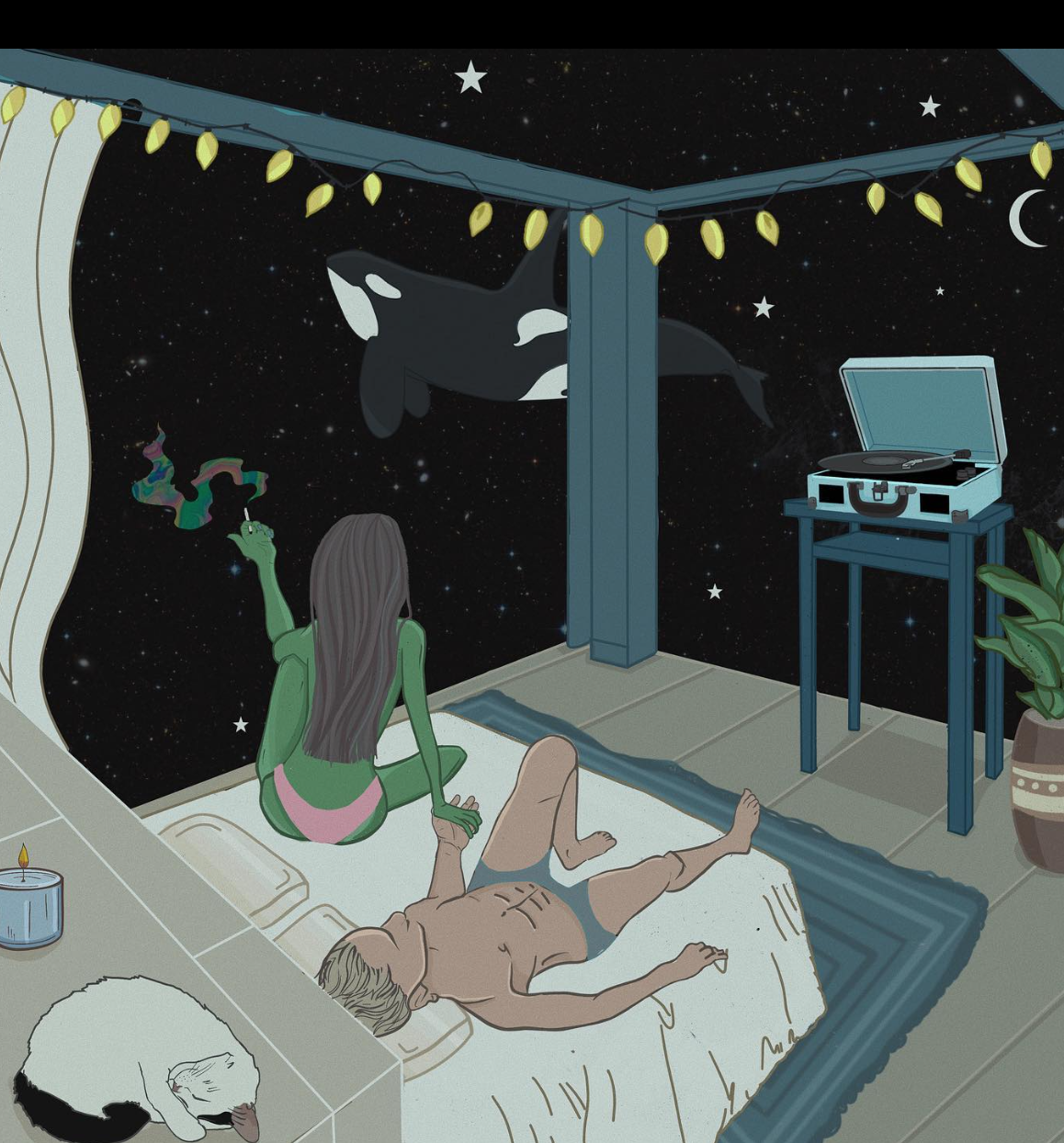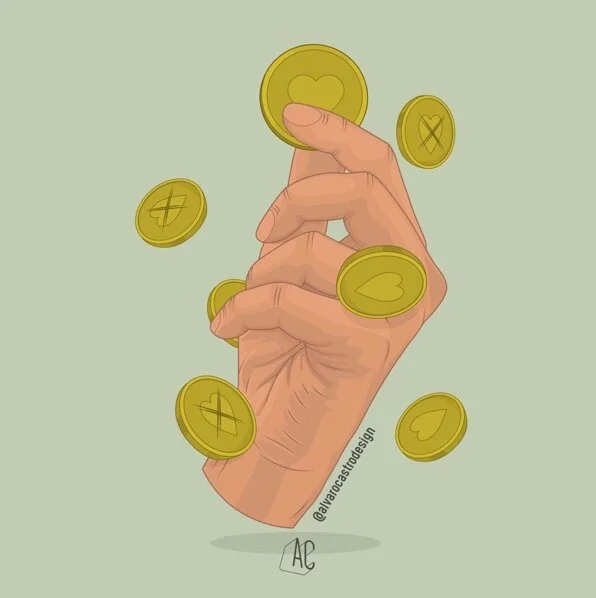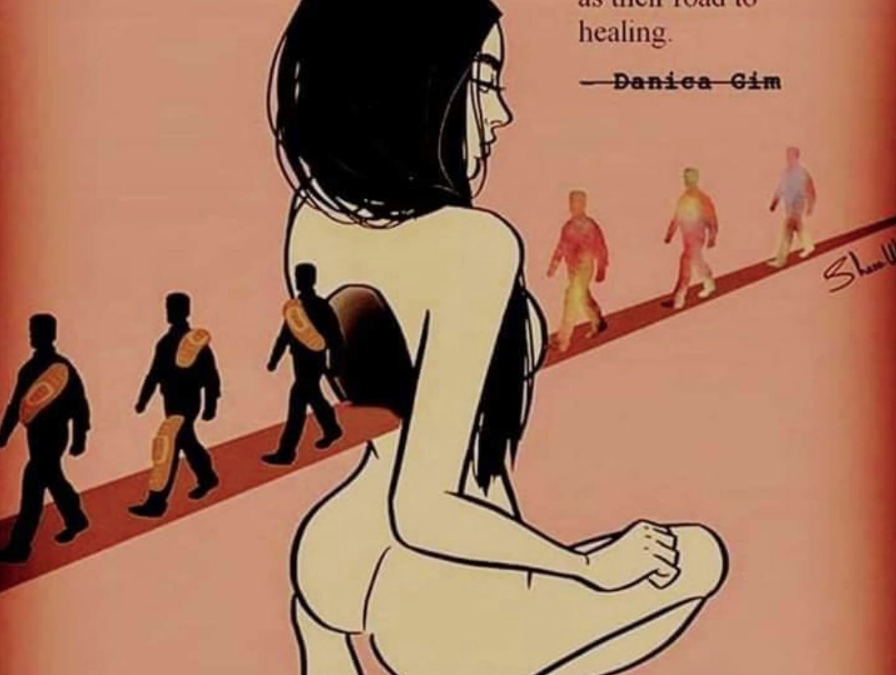Unpacking Infidelity: Surviving The Earthquake
Illustration by @muhammedsalah_
When infidelity is uncovered, it can feel like an earthquake.
People often talk about how all at once, the stability of their world as they know it shifts beneath them.
And once the ground stops shaking, people are faced with the wreckage trying to make sense of it all. Some walk away immediately, leaving it all behind. Some decide to walk through the wreckage, trying to see if they can salvage anything. In all these cases, it feels like a disaster.
my Unnatural Disaster
I was three years into my relationship when my unnatural disaster hit. I was in my first consensual non-monogamous relationship, after being a serial monogamist and married for over a decade.
This was also my first relationship with a woman. Falling in love with her felt like acknowledging, embracing, and loving a new side of myself - one that was not confined by monogamy, gender, or anyone else’s definition of love. I felt seen and known in a way that I never had before, and though we were in an open relationship, we were both so wrapped up in each other and in building our life together than neither of us wanted to see anyone else.
Weeks before we were to be married, everything changed.
I was in the midst of a personal life change - I started my own coaching and consulting practice after 15 years in non-profit work. My daughter and I moved from our Manhattan apartment - which was three blocks from Central Park and Lincoln Center - to a residential part of Brooklyn with my soon-to-be-wife. I was orchestrating the details for our upcoming wedding - taking place in front of the water - with the Brooklyn Bridge and city skyline as our background. Our expression of love both for each other and for New York City.
Despite all of the things that consumed my mind and attention, there was an underlying feeling that something was off. My wife started working later and later, she carried her phone with her everywhere she went (which was unusual for her), and she began talking a lot more about a friend of hers.
I could sense that something was going on between them. Several times I asked if there was something going on, if she had a crush, or if feelings were developing - and each and every time she denied it. She became more private, and even when she was with me, it felt as if her mind was somewhere else.
My suspicion grew, and moments before traveling to the restaurant to write our wedding vows, I found myself scrolling through her text messages - trying to find evidence that validated what my gut had been urging me to see. And I found it.
I confronted her, she admitted that she had fallen in love and they had been involved for at least 6 months. I suggested that we call off the wedding, and she committed to do whatever was necessary to repair the damage and rebuild trust. We got married, we celebrated, we separated, we started meeting with Effy Blue for relationship coaching, we argued, we learned, we cried, we laughed, and we tried to rebuild.
And despite the fact that I loved her and wanted deeply for my relationship to thrive. Despite the fact that I was the one who introduced non-monogamy into our relationship. Despite the fact that I did not like who I had become as a result of what happened, I just couldn’t seem to move on. I couldn’t let go of the hurt, the resentment, the rage, and the recurring internal narrative that I was no longer safe. My world had shaken and the pillars of my life fell down in the process. How does one recover from that?
About a year after I found out about my wife’s emotional infidelity, I became obsessed with reading about earthquakes. After months of working on our relationship and still feeling like we were on shaky ground, I began to develop a curiosity around how earthquake survivors recovered after the ground underneath their feet shook and the life they knew was forever changed. I read research papers and survivor accounts; writing pages of notes correlating the parallel between the aftermath of a natural disaster and the aftermath of my personal one.
The aftermath
Disaster experts have actually identified a pattern - a succession of phases - that individuals experience after a natural disaster, like an earthquake. From the time before the impact to the establishment of a newly constructed life, there are 6 phases:
the pre-disaster phase
the impact phase
the heroic phase
the honeymoon phase
the disillusionment phase
the reconstruction phase
Unsurprisingly these phases map on to the experience of an affair almost exactly and create a structure and a narrative around what people go through.
pre-disaster phase
The pre-disaster phase is characterized by uncertainty, anxiety, and fear.
If a disaster hits with no warning, you can feel vulnerable, out of control, and unable to protect yourself or your family.
On the other hand, sometimes there are some small warning signs that something was brewing. Sometimes there are what they call “foreshocks” - smaller quakes that precede the big earthquakes.
If you realize that you ignored the warning signs and didn’t brace yourself for the quake, you can feel guilt, self-blame, and self-anger for not heeding the warnings.
Weeks before our wedding, my wife told me that she was in love with another woman. It felt as if the world stopped. My understanding of my past, my dreams for my future, and the security that I felt in the present moment collapsed all at once.
I didn’t see it coming and I did. I was shocked and also angry at myself for not jumping into action as soon as I became intune to the warning signals. I had noticed a change in my wife’s behavior months before. But honestly, apart from those small changes, the biggest sign was in my gut; the nagging voice in my head and the strong feeling in the tightness of my chest that something was wrong.
Even though I shared my concerns and observations with her, she had always denied it. So I had overrode my intuition and tried to ignore it - because I really wanted to believe her.
The foreshocks or warning signs come in so many ways.
In some cases, the affair takes the other person away from the relationship and creates distance. This can look like spending more time out of the home, longer work hours, not being available for dates, more screen time, withdrawal, lack of sexual interest, etc.
But the signs aren’t always disconnection or distance. Sometimes people seem as if they are suddenly awakened. They become more engaged, more attentive, happier, and lighter. They may have more interest in sex or willingness to explore. I’ve seen couples grow closer amids an affair.
And sometimes, there are no signs, no warnings, no change to notice. The ground moves and shakes under you out of nowhere.
The realization that I had in fact seen the warning signs for a pending earthquake and didn’t stop it somehow made me both furious at her and also furious at myself all at the same time. I felt angry at the earthquake and angry at myself for not having the ability to prevent the disaster.
I felt vulnerable and out of control; resentful and deeply unsafe - all in a flash.
The impact phase
The impact phase of an earthquake is relatively short lived. So short lived that it’s measured in seconds. The longest-lasting earthquake ever recorded went on for 5 to 600 seconds - that’s not very long at all - but it literally shook the whole planet in space.
Survivors of earthquakes talk about their experience as feeling as if it was forever or that they thought it would never end. This is because so much happens during that short period of time.
As the ground shakes, people are flooded by a board range of thoughts and feelings from shock and disbelief, to panic and a drive for self-preservation. This is mimicked in the moment when people find out about the affair.
These days phones are often at the center of the disaster. One party checks the other’s phone and finds a text, a photo, an email, a DM. There are other ways of course, a note, credit card statements, comments from strangers, sometimes a confession.
Ultimately the ground shakes and that’s all that matters.
Moments after, as people find themselves standing in the midst of the wreckage, they often survey the damage and begin to take stock of the scope, destruction, and loss.
Personally, I experienced what Esther Perel describes in “The State of Affairs” as swinging “from depression to indignation, from lifelessness to roaring rage, from collapse to counterattack.”
She had lied to my face...multiple times. She made me feel crazy for believing something that what I knew in my body was true.
I couldn’t stand the sight of her, but also did not want her out of my sight. I was so livid that I couldn’t stand to be touched by her, but I also wanted to be held and comforted by her.
I/ we had this vision for our relationship - for our life together - and it felt ruined now. Soiled. And as I stood back and surveyed the damage, I could not understand how to put the pieces back together.
the heroic phase
In an earthquake, after the initial shock wears off, we enter into the heroic phase.
This is when the survivors of the disaster try to help one another deal with the catastrophe. In a real earthquake, this is the time when the shell-shocked community becomes altruistic and focuses on their emergency needs for food, water, and shelter. People respond as their highest selves - demonstrating adrenaline-induced rescue behavior and pulling people from the wreckage, offering needed supplies, and giving the best of themselves to meet the most dire needs.
After the revelation of an affair causes a metaphorical earthquake, this may be the phase where the initial anger and fear temporarily softens and each person can see the other person’s pain. Partners may talk all night about their feelings, reflect on their love, recommit to each other, and go out of their way to listen and try to understand each other.
Others may focus on trying to save themselves rather than the relationship. This can look anywhere between a brand new closet and a haircut to taking off to travel around the world or taking control by summoning a support network who could help them pull themselves out the wreckage.
A few weeks after finding out about the affair, we got married. And while I won’t put it at the level of heroic, looking back it does feel a bit like “adrenaline-induced rescue behavior” except I was trying to pull my relationship from the wreckage.
During those weeks leading up to the wedding, we really did work hard to listen to each other, sit in each other’s pain, and ultimately recommit to each other and our life together.
We sobbed during our ceremony, and felt a burst of possibility - that if we could respond to the situation as our highest selves, we could get through it together.
the honeymoon phase
The heroic phase in a disaster - characterized by altruism and a desire to rescue others - quickly moves into the honeymoon phase.
This short-lived phase is defined by a sense of bonding around this intense and personal common shared experience, and a hope that everything will return to normal. It is characterized by the idea that: I or we survived.
During this time, partners who are working on surviving their relationship disaster together may go to therapy, they may become physically or sexually intimate again, and because of all of the time spent talking about the relationship and their feelings - partners may feel temporarily closer than they did even before.
Those who decided to take the solo road might experience a new-found gusto. They may feel stronger than ever. They might embrace singledom with glee. Do things they may have put off for the sake of their relationship.
While this phase doesn’t last long and the bubble pops relatively quickly, it can be a glorious reprieve from the devastating shock, fear, and pain of the initial impact.
For me, this phase ebbed and flowed.
At times we felt invincible, and others irreconcilable. We spoke for hours about our relationship, went to relationship coaching, read books, attended workshops, dug into childhood wounds, and - honestly - learned more about ourselves and each other than we knew before.
We went on dates again - the rooftop bars and walks in Central Park that I had longed for. We made love and cried. We told the truth. And we began to dream again about what could be possible as we rebuilt.
Even though our relationship began to deepen, it also continued to struggle because of one important factor: she was still actively involved with this other woman. Just because their love affair was revealed and that admision broke my heart, didn’t mean that they wanted to stop seeing each other. In fact, because their relationship was out in the open, my wife wanted to spend more time with her, have overnights, and develop a non-hierarchical relationship.
I tried to focus my time alone on me - eating, watching, and doing whatever I pleased. I painted, I wrote, I went to museums and out to eat on my own. All in an effort to reconnect with myself and deepen my relationship with me.
Unfortunately, there continued to be an underlying current of disillusionment and deep disappointment that the vision for my life and relationship had taken such a sharp downward turn.
The disillusionment phase
The disillusionment phase of an earthquake hits hard and it can be long and arduous. It’s often a stark contrast to the honeymoon phase.
It’s an epic come down for most.
Hope turns into discouragement and anger and frustration reemerges. The closeness and connection warps into isolation and abandonment and deep fear and pain can creep back in.
This is actually when the individuals and the relationship are at their most vulnerable and fragile. In an actual earthquake this is when the news cycle moves on and the broader community goes back to normal. The aid and assistance might have either run out or have done as much as possible.
The survivors are now left in their individual experiences to truly face what happened square on.
Similarly for the people coming down from the honeymoon phase of the affair, the reality and stress of the situation can take a toll. Physical and emotional exhaustion creeps in. Optimism is gone, and the loss can become consuming.
Triggers can be seen everywhere, reigniting and extending the fear, resentment, hurt, fury, desperation, disgust, and heartbreak.
We were in this phase for a long time. Stuck between what brought her joy, and what caused me pain. Between who she was longing to be and be with, and who I wanted us to be.
Every time her phone dinged with a new text message, every time she had to work late, every time she left the hours on her own to run an errand, my mind became obsessed with worst case scenarios.
I imagined them together laughing and plotting how they could run off together. I wondered the intimate gestures between us - when she brushed the hair out of my face, when we laid together with legs intertwined, when she would hold my hand as we walked - if these little moments were no longer just ours. That possibility broke my heart.
I would explode into fits of rage or melt onto the floor both in tears and an inability to breathe. Her reaction to my hurt and anger fluctuated from empathy, to shame, to frustration, to disgust.
I remember feeling as if I was going mad. The angerer I got, the calmer she got. I would scream and she would stay silent. I would sob and she would sleep.
One night, after an argument on the drive home, I refused to get out of the car and go into the house with her. I sat in the car, in the cold, for over an hour. Waiting and willing her to come out to get me. I had an uncommunicated expectation that if she really loved me, if she really wanted this to work, if she really wanted to make amends - that she would attend to each breakdown, each tantrum, and each heartbroken need of mine to prove herself and our relationship.
As the time passed in the car, I moved from sad to furious. I called a local hotel to check on availability and prices, and eventually went into the house to grab an overnight bag. When I went into the livingroom I found her asleep on the couch. While I wept and raged, she slept.
I was besides myself, and I began yelling at her. I could see the disgust on her face - as if she was embarrassed for me. Repulsed and repelled by the shrieking woman in front of her.
The look on her face triggered my own sense of revulsion at my behavior and the bitter resentment I felt towards her for bringing out that side in me. I began shouting “You did this to me! Your lies, your cheating, your apathy towards my pain - my reaction is not the problem...your behavior is.”
While our arguments never again escalated to that level of mutual disgust, it was a pattern that we revisited time and time again. She would do something - big or small - that would trigger my insecurity, pain, and anger - and I would melt down in subtle or dramatic ways. She would feel repelled by my behavior and take solace alone or with her new partner, and I would feel as if I was losing my relationship...and more importantly, losing myself.
What causes the ground to shake?
So why do earthquakes happen? Both real ones and metaphorical ones.
An earthquake is the result of a shift in the tactonies planes beneath the earth’s surface. When they move, it creates a reverberation that shakes the ground above.
Similarly, the metaphorical earthquakes can be caused by individuals changing and moving in the different directions.
Earthquakes can also be caused by underground explosions - natural ones such as underground volcanos or human-made ones like weapons testing or mining.
Similarly, explosions beneath the surface of a relationship such as unmet needs, deep unresolved issues, and surfacing resentment can be the reason for a relationship to shake.
Whatever the reason, it’s worth exploring. Understanding why and how an earthquake happened will allow us to rebuild safer homes and stronger relationships.
Truth be told, there was more behind my sadness than simply being the wounded partner. I also was experiencing shame.
See, I was married when I met my wife. I was married when our friendship began to evolve into something deeper. I was married when my husband asked why my calls with her were so long and my dinner meetings were so late. And I was married when my feelings for her prompted me to ask him to open up our marriage. That marriage ended in divorce, and I was afraid that this marriage would end the same way. The byproduct of karma. My just deserts.
Eventually I realized that I could not control the outcome of this marriage, just as I could not have controlled the outcome of the last.
My first marriage did not end because I developed feelings for someone else. My first marriage ended because after a decade, we were different people and wanted different things. The 21 year olds who met in college grew into adults who wanted to live differently, love differently, and frankly - raise our daughter differently. My request to open our marriage was the invitation my husband needed to name the things he wanted, and to acknowledge that we each could no longer get what we wanted from the other person.
Similarly, my wife’s emotional infidelity was an invitation. An invitation for her to confront her pattern of serial infidelity. To see herself through the loving eyes of someone new and in turn love new pieces of herself. And to see her relationship with me with new eyes as well - both as something that is fragile and should not be taken for granted, and something that is strong and could bear the weight of her truth.
It was also an invitation for me. I had spent the first thirty years of my life playing by the rules and succeeding by someone else’s definition of success. When I left my job and married a woman, I believed that I was crafting my own path - one that was directed by my inner compass. I realized that while I had begun to fight back on external expectations, there was a much more insidious nemesis to worry about… my own inner narrative. The one that told me that I had to be the only one to be special, that my value came in the whether or not I was chosen, and that the real me - the messy, complicated, bigger than what fit inside of my skin me - that she could not be loved.
This was an invitation to fully see and love myself - and to rebuild my life deeply rooted in that self love.
the reconstruction phase
The final phase of disaster recovery is the reconstruction phase. While continuing to grieve the loss, there is an adjustment to the new “normal.” The wreckage is cleared and each person begins to assume responsibility for rebuilding their lives - whatever that may look like. Some build homes anew, others move away to start anew.
Those who decide to stay together after an affair get an opportunity to rebuild a relationship that they never thought possible. A proverbial clear piece of land to create something. They may be open to new structures such as non-monogamy, or may be reminded of how much they love the monogamous home they built together.
Those who decide to move on, do so with a greater sense of empowerment that furthers the recovery. This process is slow, and it is also abundant in its ability to reaffirm one's own belief in their capability and capacity to recover.
So, here is how we reconstructed our relationship - and how I rebuilt a relationship with myself.
First, my wife asked me what needed to happen to restore our trust and connection, and I told her that everything needed to slow down.
I asked her if she could take a break from seeing her partner. She was mad about it, but at that moment my anger seemed to trump hers and so she begrudgingly agreed. For about three months, they stopped seeing each other and limited their texts and calls. I know it was hard for both of them, particularly because they were still in the thralls of NRE; but they did it. And I appreciated the gesture, I appreciated having more of her focus. Having more time to be with each other and talk and heal. During those months we met with Effy, read books, watched youtube videos, went to workshops, and had countless hours of conversations - all focused on addressing our individual feelings, patterns, and needs as well as the needs of the relationship.
Over time, and at my pacing, they began to see each other again. First twice a month, then once a week, then twice a week. Based on my request she would be home by dinner, then by 10pm, then by midnight. And each time my wife let me lead the way. I know that was hard for her because she is wildly autonomous, and so she instinctively rejected anything that felt like rules or curfews. Yet she did it to rebuild trust and to ensure that we were moving at a pace that I felt comfortable with.
That said, it was not an easy process. She and I were both frustrated - if it was up to me they would have stopped seeing each other and if it was up to her they would have had the flexibility to see each other daily. I was mad that she cheated and she was mad that our open relationship didn’t feel open at all. There was a lot of anger, hurt, and resentment on both sides that we had to navigate through. And frankly, when you are both feeling that way, it makes it hard to remember why you are staying together. However, our shared values, the life we had built, the way in which we cared for each other, and the potential that we saw in our relationship and for our lives together kept us going.
During one conversation I remember sharing how frustrated I was that she came home an hour after we agreed. She in turn shared her frustration - the amount of times she said no to dinner, to calls, to texts so that she could honor our agreements. I saw how hard she was trying. Somehow I was able to see past my hurt and see the person who I loved - and my heart softened.
The second thing we did to reestablish connection: we sought help. A late night google search led me to Effy, and soon I was meeting with her weekly, and my wife joined us shortly after. We needed another perspective. We needed someone to help us break out of our own narrative and open us up to other possibilities. I was able to hear things from Effy that I could not hear from my wife, and she was able to unpack our behaviors in ways that resonated both in our hearts and our nerdy heads.
In that space, we were able to tell the truth, knowing that there was someone there to catch us so we wouldn't fall too far into our struggle without knowing the way out.
We weighed our options. Had the difficult conversations. And practiced listening to each other.
We each did our own work with Effy and in therapy to understand how she could experience the freedom that she needed in a way that didn’t hurt me, and how I could let go of the original vision for my relationship without betraying myself and my needs.
The third step we took to rebuild was eventually both accepted that there is no timeline for healing. It will take as long as it takes.
As time passed, we both grew tired of dissecting ourselves and our relationship. We wanted to be past it, to be “back to normal.” Except there was no going back, the relationship that we once had was over, and we were in the process of building a new relationship - one that included both depper pain and deeper joy and connection then we had before.
And in accepting that the pain would just go away, we both had some work to do to help the pain feel more manageable.
For her part, it was important that she would check in with me to ask me how I was feeling, and to proactively create room for me to share my hurt and sadness. Often it is the responsibility of the person who was cheated on to continue to say “I am hurt”, “I am scared”, “I need reassurance.” Over time, both the person who cheated and the person who was cheated on likely thinks - Still! You are still hurting? You are still angry?
And the answer is yes...still. When the earth beneath your feet shakes and shakes your sense of safety and stability, it takes a while to recover.
By proactively checking in after her dates and asking me how I was feeling, by inviting dialogue about it the stories in my mind, and my continuing to apologize - unprompted - for the hurt that her actions caused, it helped me feel like I did not have to keep reminding her that I was in pain - which reduced the resentment, and replaced it was growing trust.
As for my part, I needed to work on reframing. Instead of continuing to see the event as a disaster that destroyed my life, I worked to reframe it to see the event as the invitation for both of us to dig deeper into ourselves and our relationship. That reframing enabled me to be more patient with myself when I felt exhausted from the pain.
The fourth step on the journey I had to take on my own. I needed to revisit my expectations for my wife and our relationship.
I wanted excitement in my life. Passion. Romance. Eroticitism. I wanted those things from my relationship with my wife. And...I wanted her to want those things too.
I remember telling her that I wanted her to want to take me out to museums or for drinks. I wanted her to want to write me letters and read me poetry. Or sometimes I wouldn’t tell her what I wanted at all, and would secretly pine for things with the unspoken expectation that she would somehow know what I wanted and how to deliver it because I wanted her to want it too.
I essentially wanted new relationship energy all of the time.
And while I have come to realize that the NRE phase doesn’t fade for me like with other people, I understand that when the newness of a relationship is gone - for some - so is the drive for passion, excitement, and romance.
So we both revisited our expectations. I realized that she was not my only source of passion, ertoticsm, and romance - I started dating, went to CNM events, took myself out on long dates to the museum and for drinks, and I spent more time with friends. I expanded my support system and my connections and stopped expecting that one relationship would fill all of my needs.
On her part, Effy introduced my wife to the concept of NRE redistribution - which is essentially leveraging the time and energy that you put towards a new relationship to also feed into your existing one. Excited to plan a fancy date with your new partner? After you do that, ask yourself when the last time you went on a date with your existing partner, and plan something fun for the two of you. Buying gifts for your new partner? Ask yourself when the last time you bought something for your current partner, and think of something special you could get them. Essentially, use the prompts that are driving your creativity and generosity for your new relationship to pour into your existing one as well.
Lastly on the road to healing, I worked to let go of the labels. I had gotten stuck on what we were - Were we open or poly? Hierarchical or non-hierarchical? Was I her primary partner, her nesting partner?
While I had left the framework of monogamy, I got stuck trying to determine the framework of non-monogamy. From one construct to another. While I rejected labels in all other areas of my life, I was holding on to labels in my relationship as a way to define my value and significance. As a way to distinguish myself as special, important, and worthy of love.
I realized that that work was about my healing with myself, and that no amount of labels can define my value. So instead, I focused on letting go of what to call it, and instead we focused on designing a relationship that worked for us.
It's been four years since the earthquake, my wife and I are still together. Our relationship looks really different now - not at all what I expected or planned for - and yet it’s one that feels deeply safe and rooted in trust and mutual respect. We have a stronger, closer, and more honest relationship than before.
She continued her relationship with her partner for several years after I found out about their relationship, and two years later I fell in love with someone and moved in with them. I now split my time between the two homes with my wife and my partner. I am constantly surprised by how much love my heart is able to hold… holding room not only for my relationships - but more importantly, for me.
Illustration by @muhammedsalah_
Still have questions? Check out the podcast, or find community on Facebook and Instagram. You do not need to figure this out on your own; stay find and connect with a curious community of friends.
To hear more curious and courageous stories, subscribe to Curious Fox for free or find us on Patreon for even more bonus content. Each week you will find more stories and lessons, as well as ways that you can explore your curiosity.































